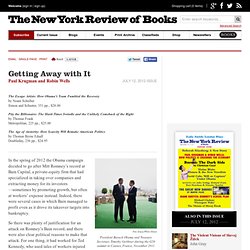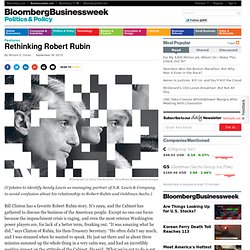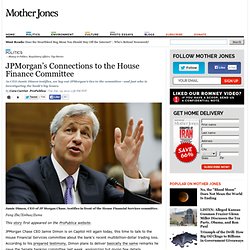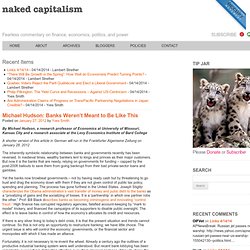

Getting Away with It by Paul Krugman and Robin Wells. The Escape Artists: How Obama’s Team Fumbled the Recovery by Noam Scheiber Simon and Schuster, 351 pp., $28.00 Pity the Billionaire: The Hard-Times Swindle and the Unlikely Comeback of the Right by Thomas Frank Metropolitan, 225 pp., $25.00 The Age of Austerity: How Scarcity Will Remake American Politics by Thomas Byrne Edsall Doubleday, 256 pp., $24.95 In the spring of 2012 the Obama campaign decided to go after Mitt Romney’s record at Bain Capital, a private-equity firm that had specialized in taking over companies and extracting money for its investors—sometimes by promoting growth, but often at workers’ expense instead.

So there was plenty of justification for an attack on Romney’s Bain record, and there were also clear political reasons to make that attack. Yet as we were writing this review, two prominent Democratic politicians stepped up to undercut Obama’s message. Senator Mark Warner, Leading Democratic Critic of Volcker Rule, Invests With J.P. Morgan Unit Likely Affected By Volcker Rule.
Rethinking Robert Rubin. (Updates to identify Sandy Lewis as managing partner of S.B.

Lewis & Company to avoid confusion about his relationship to Robert Rubin and Goldman Sachs.) Bill Clinton has a favorite Robert Rubin story. It’s 1999, and the Cabinet has gathered to discuss the business of the American people. Except no one can focus because the impeachment crisis is raging, and even the most veteran Washington power players are, for lack of a better term, freaking out. “It was amazing what he did,” says Clinton of Rubin, his then-Treasury Secretary. Rubin’s knack for spreading wisdom and tranquility has been the defining trait of his professional life. Photograph by Ed Quinn/CorbisRubin in the 1960 Harvard yearbook This legendary stillness, combined with decades of economic and market expertise, keeps Rubin in constant demand.
It’s enough to keep a 74-year-old plenty busy. Which is not to say he dismissed the idea lightly.
John Reed on Big Banks' Power and Influence. BILL MOYERS: Welcome to our third episode about the powerful players in high places who rewrote the rules of American politics and the economy.

You can read all about it in this book: Winner-Take-All Politics: How Washington Made the Rich Richer and Turned Its Back on the Middle Class. If you missed the first two programs, you can see them on our new website, BillMoyers.com. The first is with Winner-Take-All authors Jacob Hacker and Paul Pierson; the second with David Stockman and Gretchen Morgenson on “crony capitalism.” In this edition, we’ll look at a seminal moment when Wall Street and Washington stacked the deck against the rest of us.
Remember, this is the political equivalent of a crime story, a mystery. Well it didn’t happen by accident. Investment and lobbying: Money and politics.
Senators Grovel, Embarrass Themselves at Dimon Hearing. JPMorgan’s Connections to the House Finance Committee. Jamie Dimon, CEO of JP Morgan Chase, testifies in front of the House Financial Services committee.

Fang Zhe/Xinhua/Zuma This story first appeared on the ProPublica website. JPMorgan Chase CEO Jamie Dimon is on Capitol Hill again today, this time to talk to the House Financial Services committee about the bank's recent multibillion-dollar trading loss. According to his prepared testimony, Dimon plans to deliver basically the same remarks he gave the Senate banking committee last week, apologizing but giving few details. His Senate hearing was hardly a grilling; senators mostly praised him for his "emphasis on continuous quality improvement," in the words of Senator Jim DeMint, R-S.C.
As we charted last week, JPMorgan happens to have plenty of connections to the Senate committee. The House Connections JPMorgan has two in-house lobbyists with connections to the House Financial Services committee. Rick Lazio joined JP Morgan in 2004 as chief of government relations. Michael Hudson: Banks Weren’t Meant to Be Like This. By Michael Hudson, a research professor of Economics at University of Missouri, Kansas City and a research associate at the Levy Economics Institute of Bard College A shorter version of this article in German will run in the Frankfurter Algemeine Zeitung on January 28. 2012 The inherently symbiotic relationship between banks and governments recently has been reversed.

In medieval times, wealthy bankers lent to kings and princes as their major customers. But now it is the banks that are needy, relying on governments for funding – capped by the post-2008 bailouts to save them from going bankrupt from their bad private-sector loans and gambles. Yet the banks now browbeat governments – not by having ready cash but by threatening to go bust and drag the economy down with them if they are not given control of public tax policy, spending and planning. If there is any silver lining to today’s debt crisis, it is that the present situation and trends cannot continue. The revolving door. Cognitive Regulatory Capture.